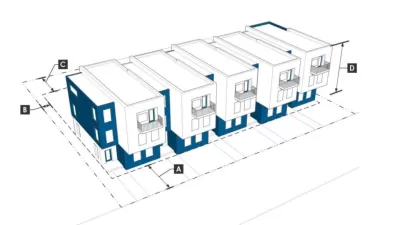New research shows that affordable housing mandates usually don't raise housing costs, but often fail to benefit benefit the lowest-income families.

Research from the National Housing Conference's Center for Housing Policy clarifies the impacts of inclusionary zoning policies, which require developers to include some affordable units in their buildings. Brentin Mock from CityLab summarizes the major findings.
The good: In most cases, inclusionary zoning requirements haven't driven housing costs up. Nor have they slowed housing production. Those findings challenge the argument of some developers who oppose affordable-housing mandates, especially in California.
The bad: Inclusionary zoning policies have largely failed to create affordable housing for the lowest-income households—and most policies aren't designed to target them. That can lead to a lack of support for programs:
After all, if it’s going to be called “inclusionary zoning,” it should include those who are most in need of housing. People actually need to be able to buy into the properties in order to buy in to the policy.
Pittsburgh is considering ways to address this problem, which Washington, D.C. also dealt with recently. San Francisco, New York, Seattle, and more cities throughout the United States have also recently taken up questions around inclusionary zoning.
The research also notes that the success of these policies is influenced by factors that can vary by city and over time, like the strength of an area’s housing market or a policy's compatibility with state law.
FULL STORY: Inclusionary Zoning Does Not Drive Up Housing Costs

Planetizen Federal Action Tracker
A weekly monitor of how Trump’s orders and actions are impacting planners and planning in America.

Congressman Proposes Bill to Rename DC Metro “Trump Train”
The Make Autorail Great Again Act would withhold federal funding to the system until the Washington Metropolitan Area Transit Authority (WMATA), rebrands as the Washington Metropolitan Authority for Greater Access (WMAGA).

The Simple Legislative Tool Transforming Vacant Downtowns
In California, Michigan and Georgia, an easy win is bringing dollars — and delight — back to city centers.

The States Losing Rural Delivery Rooms at an Alarming Pace
In some states, as few as 9% of rural hospitals still deliver babies. As a result, rising pre-term births, no adequate pre-term care and "harrowing" close calls are a growing reality.

The Small South Asian Republic Going all in on EVs
Thanks to one simple policy change less than five years ago, 65% of new cars in this Himalayan country are now electric.

DC Backpedals on Bike Lane Protection, Swaps Barriers for Paint
Citing aesthetic concerns, the city is removing the concrete barriers and flexposts that once separated Arizona Avenue cyclists from motor vehicles.
Urban Design for Planners 1: Software Tools
This six-course series explores essential urban design concepts using open source software and equips planners with the tools they need to participate fully in the urban design process.
Planning for Universal Design
Learn the tools for implementing Universal Design in planning regulations.
Smith Gee Studio
City of Charlotte
City of Camden Redevelopment Agency
City of Astoria
Transportation Research & Education Center (TREC) at Portland State University
US High Speed Rail Association
City of Camden Redevelopment Agency
Municipality of Princeton (NJ)





























